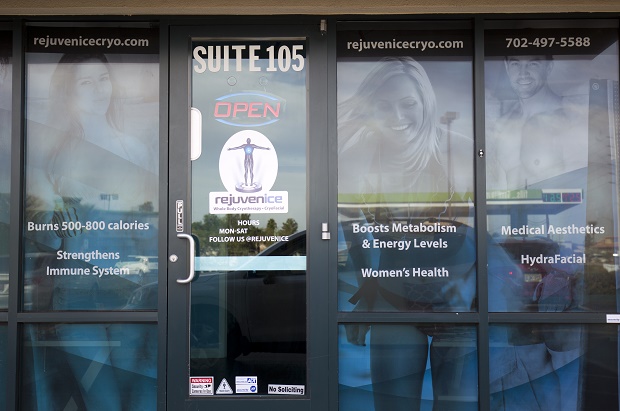Cryotherapy use spreads, though it’s unproven, unregulated

An exterior view of the Rejuvenice spa is shown in Las Vegas, Tuesday, Oct. 27, 2015. Authorities say the Las Vegas spa where employee, Chelsea Patricia Ake-Salvacion, was found dead inside a liquid nitrogen chamber used for cryotherapy treatments wasn’t licensed to operate. Cryotherapy involves the use of low temperatures to relieve pain. STEVE MARCUS/LAS VEGAS SUN VIA AP
LAS VEGAS — From Japan to Europe and now in the US, a growing number of people are seeking cryotherapy — a treatment that subjects their bodies to temperatures far below those found anywhere on Earth.
Backers claim it can ease pain and inflammation, aid blood flow and weight loss, improve skin and even ward off aging and depression.
The treatments, however, have come under scrutiny after a Las Vegas spa employee was found dead last month in the chamber of a cryotherapy machine chilled by liquid nitrogen.
Cryotherapy involves entering the cold chamber and spending two to four minutes in temperatures ranging from minus-166 to minus-319 degrees Fahrenheit (minus-110 to minus-195 Celsius).
READ: Fil-Am in Nevada cryotherapy chamber died in seconds
It is believed to have started in Japan in the 1970s to treat inflammatory conditions such as rheumatoid arthritis. It has been used by professional athletes on the premise that inflammation caused by exercise could also be treated by extreme cold and has made its way across the globe. It is primarily used in Eastern Europe.
Joseph Costello, a researcher with the University of Portsmouth in England who studies cryotherapy, said the entire rugby team of Wales traveled to Poland to use the technology in 2011. It hit the US about two years ago and now, the NBA’s Cleveland Cavaliers said the professional basketball team has its own cryotherapy chamber at its training center. The treatments are also available at some spas, sports medicine clinics and wellness centers.
Las Vegas police and Nevada state officials have opened investigations into the circumstances involving the death, but it has moved slowly because the industry is so new in the state that no one agency assumed responsibility for it.
Nevada’s chief medical officer said Tuesday that the Bureau of Health Care Quality and Compliance will assume responsibility for investigating complaints as the state health department takes over an expanded probe to determine whether or not the treatment itself is safe. The long review process is now only in its fact-finding stage, but Dr. Tracey Green said some form of education, regulation, scope of work agreement and/or licensure could ultimately be proposed.
“Education will be very important because there are many alternative services in many areas of medicine, science, health, nutrition and beauty. We need to be conscious consumers,” Green said.
And any rules or policies put in place in Nevada would mark some of the first regulations in the world governing cryotherapy.
In other states, oversight varies widely. The Colorado Department of Regulatory Agencies has assigned cryotherapy to a medical category that requires doctor oversight. California officials said its industrial relations and consumer affairs departments and state medical board have no oversight of the practice, calling it an experimental and alternative treatment unsupported by evidence.
Given that the lowest temperature ever recorded on Earth was minus-128 degrees Fahrenheit (minus-89 Celsius), experts say the health impacts of cryotherapy can’t be predicted without more research. Costello urged that more studies should be done and noted that it may take a long time to fully understand the risks and possible benefits.
“Technology is moving at such a rapid pace, but it often takes time for scientific studies to be completed,” he said.
The science and medical communities haven’t embraced cryotherapy, and the US Food and Drug Administration has not approved any whole-body cryogenic devices for medical use.
The FDA said in a statement it would regulate any device if a manufacturer makes medical claims such as reducing muscle soreness, shortening injury recovery time or increasing blood circulation, but not if the claims are non-medical and involve such things as comfort, soothing or relief.
Eric Rauscher, founder of Dallas-based distributor CryoUSA, said the company supports some form of regulation and specifically trains buyers of the machines not to make medical claims. Rauscher said he’s even voided warranties after discovering customers advertising otherwise.
“We tell them ‘let’s not use words like treatment and procedures — these are sessions. These aren’t your patients, they are clients,'” Rauscher said.














